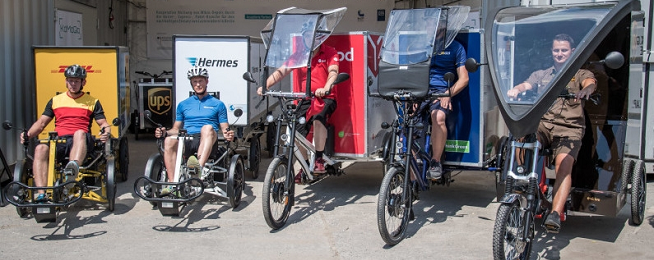A massive trial of parcel delivery in Berlin has established that cargo bikes can do the job of making delivery to the door viable and sustainable.
Over 12 months, more than 160,000 packages were distributed around the Berlin Prenzlauer Berg district by Germany’s largest delivery firms.
The parcel service providers involved were able to continuously increase the parcel volumes delivered during the course of the project.
Up to 11 cargo bikes were in use every day and a total of 38,000km were covered.
As a result, around eleven tons of CO2 was saved, compared to conventional delivery vehicles.
The riders used mainly e-cargo bikes within a radius of up to three kilometres around the depot location.
The so-called KoMoDo trial, which cost $650,000 to stage with a grant from the National Climate Initiative, found that several elements have to be present for such a delivery system to work:
- you need to be located in a district with high receiver density
- the consignment structure (number of packages, their volume and weight) be suitable for cargo bikes
- the delivery firms need to co-locate
- operation should be from “mini-depots” rather than from typically large parcel logistic centres
Such has been the success of the trial that even with the end of public funding it has been rolled over for another six months arrangement from the same depot and with the same firms involved.
In addition, the Department for the Environment, Transport and Climate Protection, together with local government has began searching for suitable locations for further micro-depots in Berlin on the basis of the project results.
The trial concluded that in densely populated inner cities, public space is a scarce resource that should be used cooperatively and efficiently.
The use of cargo bikes on the last mile was found to be environmentally friendly as journeys with conventional delivery vehicles were replaced.


